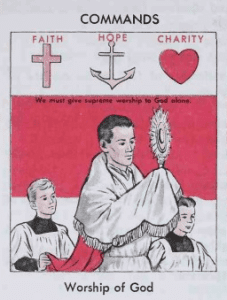Hope in Love
For those who are led by the Spirit of God are sons of God. For you did not receive a spirit of slavery to fall back into fear, but you received a Spirit of adoption, through whom we cry, “Abba, Father!” The Spirit himself bears witness with our spirit that we are children of God, and if children, then heirs, heirs of God and joint heirs with Christ, if only we suffer with him so that we may also be glorified with him.” (Romans 8:14-18)
When I was a child, I didn’t understand Hope. I can still remember learning from the Baltimore Catechism about the theological virtues. It defined Hope as “a Divine virtue by which we firmly trust that God will give us eternal life and the means to obtain it.” And for some reason, it depicted Hope as an anchor. Faith was shown as a cross, and that just seemed to make sense. And Charity was of course shown as a heart-shape.

Hope. To trust that God would follow through on his promise of heaven. But how was that different than Faith? In Faith, we are asked to believe that God is the source of creation, that He is the sum of all good, that He is Three-in-One, and that the Son became man, suffered, died, and rose again to open the gates of heaven so that I may be saved. Faith was to accept this and to Love was to live in accordance with it. I understood that. Hope seemed to me to be redundant to Faith or perhaps a particular expression of it.
For a long time, I mentally breezed over it when praying acts of Faith, Hope, and Love. And when I say a long time, I mean for most of my life. I don’t know this, but I have a sneaky suspicion that I’m not alone in this.
But as life continues to stretch on with its increasing and all-too-often self-inflicted burdens, I believe that I’m finally coming to understand why the Church – at least as early as St. Paul – distinguished Hope as one of the three virtues upon which our relationship to God is built.
Are you gripped by depression? It is a cloud that comes unbidden to darken the skies of the soul. Do you struggle with anxiety? Worry, apprehension, and uneasiness about the uncertainties of life can overwhelm one to such an extent as to be paralytical. What about nihilism, the sense that nothing matters and there is nothing to be done about it? Being a lifelong witness to the evils of the world can be enough to get us to stop trying to make a positive difference.
While these conditions don’t need a reason to plague a soul, they are often exacerbated by the experiences of our lives. Thoughts of our failures, our sins, and our inadequacies give fuel to this evil fire, as does the fixating fears about a world that always seems to be burning in the fires of conflict and injustice. The longer we live, the more material we have to feed these flames.
And then the evil one, the accuser, arrives to whisper in our ear: “You aren’t good enough. God’s Love is not enough.” We are beckoned to the greatest sin, despair.
If despair is the sin against the Holy Spirit, then Hope is His virtue!
His Fire is not the fire that burns us to ash but is the fire of the burning bush that does not consume the wood. It is an everlasting Fire from which we rise in rebirth to the heavens of Love. For God’s Love is real and always invites us. The thought that we are not good enough for His Love is the greatest lie ever told.
God sent the Holy Spirit to the Church – us – after Christ’s Ascension. The Son’s completed mission on earth redeemed us and lifted humanity to the divine, the final step was to fill each and every one of our souls with this life, and that day came on Pentecost. By tongues of fire, the divine life entered into human souls. As long as that holy fire burns in us, the promise of following Jesus into the Father’s kingdom can be fulfilled for every one of us, no matter our failings. That is the Promise; and it is Hope that keeps our eyes heavenward and rejects the self-defeating fears of the mind.
So pray to God for Hope. Think on it, meditate on it. It is vital to our salvation; it is not an afterthought sandwiched between Faith and Love. Remember St. Paul’s words to the Corinthians:
“When I was a child, I spoke like a child, I thought like a child, I reasoned like a child; when I became an adult, I put an end to childish ways. For now we see in a mirror, dimly, but then we will see face to face. Now I know only in part; then I will know fully, even as I have been fully known. Faith, Hope, and Love endure.” (1 Corinthians 13:11-13a)